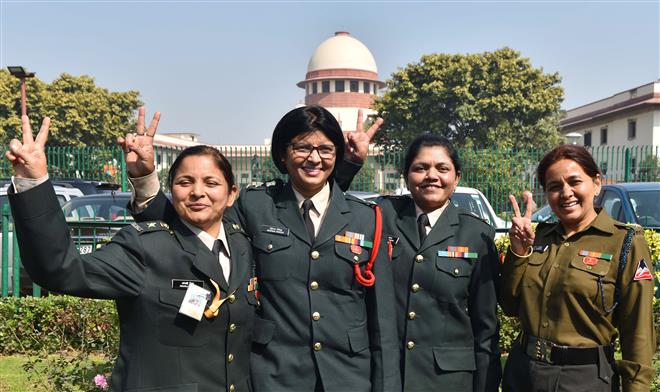Permanent Commission for Women
2020 FEB 12
Mains >
Polity > Judiciary > Security forces and Police

WHY IN NEWS?
Hitting out at gender stereotypes, the Supreme Court (SC) recently granted permanent commission to women officers in the Indian army.
PERMANENT VS SHORT SERVICE COMMISSION:
|
Permanent Commission
|
Short Service commission
|
|
A Permanent Commission means a career in the Army till retirement. i.e. up to the present retirement age of 60 years.
|
In SSC one has the option of Joining the Army and serve for 10 years, which can be extended by another 4 years.
|
|
Permanent Commission Officers have to compulsorily serve for 20 years if one has to avail pension, and then up to the age of superannuation.
|
SSC Officers have to compulsorily serve for 10 years after which you can extend it for maximum 4 more years. They can resign at any time during this period of 4 years extension.
|
|
For Permanent Commission, one has to join National Defence Academy, Pune or Indian Military Academy, Dehradun or Officers Training Academy, Gaya.
|
At the end 10 years, they have 3 options:
1. Elect for a Permanent Commission
2. opt out of service
3. Take the 4 years extension
SSC officers become eligible for permanent commission upon completion of 10 years of service, depending on their performance and vacancies in higher ranks.
|
|
Entry is carried out through various means such as National Defence Academy exam, 10+2 (TES) Entry, Combined Defence Service Examination and University Entry Scheme
|
Entry is carried out through graduate level examinations for Technical and Non-Technical posts, NCC Entry etc.
|
|
An officer who joined with Permanent Commission has no option to switch over to Short Service Commission.
|
In SSC max rank that can be reached is Brigadier. After retirement from SSC they are not entitled to facilities like ECHS, pension and other benefits.
|
BACKGROUND:
- Women officers were first inducted in the military nursing service in 1927 and as medical officers in 1943.
- In 1992, women were made eligible for appointment as officers in certain specific cadres such as Judge Advocate General (JAG) and Army Education Corps (AEC). Women were initially brought in for 5 years of service, which was then converted into Short Service Commission (SSC). However, women were not given the choice to opt for permanent commission at the end of their 10-year service.
- In 2008, permanent commission was extended to women in streams of Judge Advocate General and Army Education Corps.
- In 2019, the government decided to grant permanent commission to women in all 10 branches where they are inducted for Short Service Commission. However, the benefit was not applicable retrospectively and thus ruled out the women officers in the job now.
- In 2010, Delhi High Court granted eligibility to women officers for permanent commission in the Army. However, the central government appealed against this in the Supreme Court.
RECENT JUDGEMENT:
- Supreme Court granted permanent commission for women:
- It rejected the government contention that women are "physiologically weak" to be granted permanent commission and command appointments.
- It called this argument emanating from a deeply ingrained gender stereotype in the Indian society which regards a man as being dominant and women are considered weak links and caregivers only.
- Struck down distinction in granting service:
- The central government had proposed a differentiated stand. SSC women officers with up to 14 years of service were to be considered for permanent commission. But officers with more than 14 years of service would only be allowed to serve up to 20 years without being considered for permanent commission. After that, they were to be released with retirement benefits.
- The court held this policy to be violative of the right to equality.
- The court also ruled that there cannot be an outright prohibition on women being considered for command appointments. But women officers will be eligible for command posts in non-combat areas.
- The bench held that the judgement will not be applicable to the combat roles. It also added that if the Army does have convincing reasons for excluding women from a particular criteria or command appointment, it may provide them to the relevant authorities and, if necessary, to future courts.
- It granted the Centre three months' time to enforce its order.
IMPLICATIONS:
CONCLUSION:
- There is no need to appeal to the army for a change of mind-set. Sheer logic, as well as precedent from other countries, have shown that women are equally capable as their male counterparts and should be given equal respect and treatment.
- With the development in technology, most of the modern military weapons are so light and recoil-free that they require no significant physical abilities. Hence, the oft-quoted argument of lower physical standards of women is no longer valid in modern warfare and combat.
- However, what is frightening is the government’s stand in the court. It is but a mirror reflection of the patriarchal mindset that runs deep in the society, even in the modern era.
- Women in India continue to remain largely ignored. The dismal maternal health statistics, labour force participation rates and rising atrocities against them are indications of this ignorance. Hence, the present verdict can be considered as a pivotal point in the strive towards gender equality.
Practic Question
Q. Discuss the significance of granting Permanent commission to women in Armed forces towards addressing gender inequality in India?
